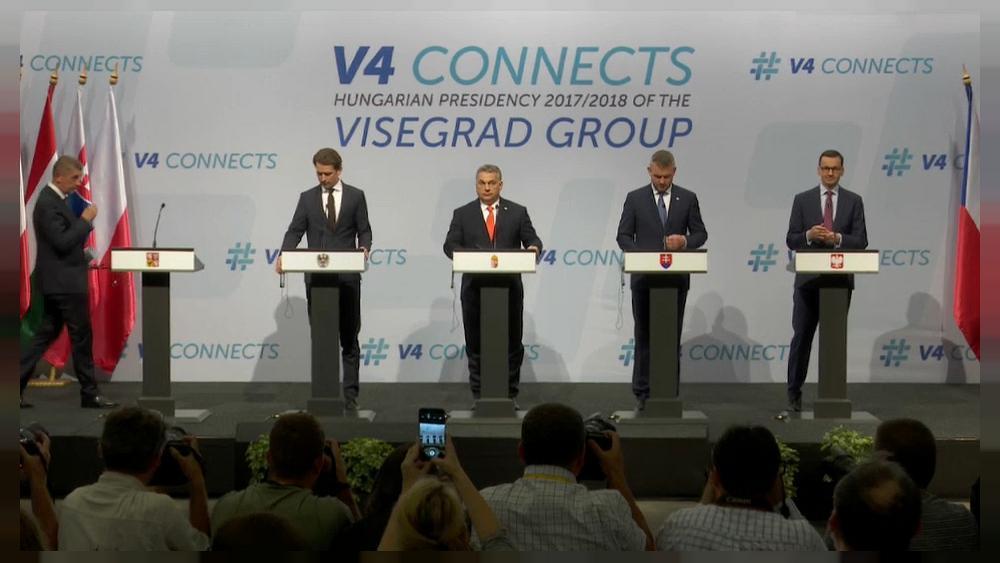https://www.ft.com/content/06dd0240-7499-11e8-b6ad-3823e4384287
A nationalist Germany is not an impossibility
Cheering populists elsewhere in Europe should be careful what they wish for
Philip Stephens 3 hours ago
Angela Merkel is besieged. The Bavarian sister party of the German chancellor’s Christian Democratic Union wants tougher frontier controls. The anti-migrant pose struck by Horst Seehofer, the Christian Social Union interior minister in Ms Merkel’s coalition, is cheered by populists from Warsaw to Rome, via Vienna and Budapest. Have any of them thought, some of us wonder, what a Germany taking a nationalist turn might actually look like?
Mr Seehofer’s motives are transparent. The CSU suffered a mauling at the hands of the unashamedly xenophobic Alternative for Germany (AfD) in the 2017 national election. Facing a state poll in October, the party now wants to outflank AfD. EU leaders will discuss a European-wide migration scheme later this month. If he is not happy, Mr Seehofer is threatening unilateral controls.
Many Germans — a majority, the latest poll suggests — remain suspicious of the chancellor’s open borders strategy. Among neighbours, the Visegrad Four — Poland, Slovakia, the Czech Republic and Hungary — are fierce critics. Jaroslaw Kaczynski, the leader of Poland’s ruling Law and Justice party and Hungary’s prime minister, Viktor Orban, scorn efforts to disperse asylum seekers across the union.
Italy’s new government — a populist coalition of the Five Star Movement and the anti-migrant League — is shutting ports to refugees crossing from north Africa. Matteo Salvini, the interior minister and leader of the League, made it an early act to turn away the rescue ship Aquarius. Austrian conservative leader Sebastian Kurz proposes an “axis” with fellow hardliners in Rome and Berlin to seal the frontiers.
The populists are united in their simple sloganising. Hungary’s population is shrinking and ageing, as talented young people seek opportunities elsewhere. Yet Budapest is proud of its barbed-wire camps for asylum seekers and migrants unfortunate enough to cross the border.
The reality, of course, is that no single government can take control of its frontiers. The narrow national interests held dear by populists frequently collide with each other. It is forgotten now, but Ms Merkel kept open Germany’s borders in 2015 to ease pressure on Austria. Vienna risked being overwhelmed by refugees bussed from, well, Mr Orban’s Hungary.
The nationalists’ pitch is to fear and emotion rather than reason. If they thought about it, they would know that beggar-thy-neighbour policies cannot work. Closing a border has a ricochet effect. Mr Kurz must surely realise that Mr Seehofer’s plans would leave Austria to cope with refugees stranded on the wrong side of the German border.
Does Mr Salvini understand, one wonders, that Mr Seehofer wants those arriving at the German frontier to be returned to the place they were first registered? Much of the time, that would be Italy. The Mediterranean front-line states complain their northern partners do not share the migrant burden. Polish and Hungarian nationalists would be the very last to make such an offer.
Untying this Gordian knot with a migration system that is humane, fair and sustainable requires a collective effort to harden the EU’s external borders and equitably accommodate those granted asylum. It demands also more effort — and aid — to help sub-Saharan Africa. This is what Ms Merkel and Emmanuel Macron, the French president, have been discussing. Mr Seehofer has no real alternative.
He is far from alone, however, in selling his party as one that puts Germany First. Nor is a rising nationalist mood confined to hostility towards migration. Markus Söder, the CSU prime minister of Bavaria, thinks the country has broader lessons to learn from Donald Trump’s belligerent unilateralism.
It is not at all hard to imagine where a new German nationalism could lead. The AfD made its name opposing financial support for weaker members of the eurozone — the so-called transfer union that leaves Germans at the mercy of supposedly profligate southern Europeans. As principal EU paymaster, why not extend the principle beyond the single currency to other projects?
Mr Kaczynski is forever hurling insults in the direction of Berlin. Yet Poland is the biggest recipient of EU aid. Why should German taxpayers write large cheques to Warsaw? Likewise for Hungary, where the government is substituting crony capitalism for the market economy — in significant part at Germany’s expense. Berlin could better deploy its economic clout to projects that confer direct national advantage.
Those with dark memories of war have less to fear. There is nothing militaristic about Germany First politics. The impulse, rather, is isolationist. Most Germans would probably spend less on defence. And why not? The nation is too powerful to be threatened by its neighbours. Berlin can always reach an accommodation with Moscow: Russian energy for German technology makes for a natural fit. Let Poland and others on the EU’s eastern frontier pay for Nato if they feel threatened by Russia.
Germany is some way off reaching such judgments. Ms Merkel is still convinced — and rightly so — that the nation’s long-term interests reside in liberal internationalism. The chancellor will not easily surrender her convictions. But she has been weakened. After 12 years, her time is running out. And Mr Seehofer and his allies are setting a different direction of travel. Those cheering populists elsewhere should be careful what they wish for.
EU - what's next?

- Guest
- Post n°251
 Re: EU - what's next?
Re: EU - what's next?

- Posts : 22555
Join date : 2014-12-01
- Post n°252
 Re: EU - what's next?
Re: EU - what's next?
Da, a inače im Švabo daje tu lovu zato što ih voli, a ne zato što time finansira sopstveni izvoz zadužujući dugoročno Poljake, Đamare i ostalu jad sa istoka.

- Posts : 10694
Join date : 2016-06-25
- Post n°253
 Re: EU - what's next?
Re: EU - what's next?
The nationalists’ pitch is to fear and emotion rather than reason. If they thought about it, they would know that beggar-thy-neighbour policies cannot work. Closing a border has a ricochet effect. Mr Kurz must surely realise that Mr Seehofer’s plans would leave Austria to cope with refugees stranded on the wrong side of the German border.
To nije tacno jer ce Albaniju i Srbiju napraviti za azilantske centre.
To se vise ni ne krije.

- Posts : 10317
Join date : 2012-02-10
- Post n°254
 Re: EU - what's next?
Re: EU - what's next?
Austrija je izgleda postala deo Visegradske grupe?

Ko je sledeci? Italija?

Ko je sledeci? Italija?

- Posts : 11663
Join date : 2018-03-03
Age : 36
Location : Hotline Rakovica
- Post n°255
 Re: EU - what's next?
Re: EU - what's next?
Danska obećava. 

_____
Sve čega ima na filmu, rekao sam, ima i na Zlatiboru.
~~~~~
Ne dajte da vas prevare! Sačuvajte svoje pojene!

- Posts : 22555
Join date : 2014-12-01
- Post n°257
 Re: EU - what's next?
Re: EU - what's next?
Hubert de Montmirail wrote:Austrija je izgleda postala deo Visegradske grupe?
Ko je sledeci? Italija?
Zapravo, to je bio sastanak na kome su odjebali Evropski savet za sledeći samit na kome je trebalo da se raspravlja o migrantima i kvotama i Italija je saopštila da kao ni Višegradska grupa neće učestvovati.


- Guest
- Post n°259
 Re: EU - what's next?
Re: EU - what's next?
Predsednik SAD Donald Tramp je tokom samita “velike sedmorke“ u Kanadi bacio nekoliko bombona kancelarki Nemačke Angeli Merkel.
To je saopštio televiziji CBS politički analitičar Jen Bremer, a prenosi Sputnjik.
Po Bremerovim rečima, incident se desio pri kraju samita dok su lideri država pokušavali da izvrše pritisak na Trampa da on potpiše zajedničko saopštenje.
Na kraju je Tramp izjavio da pristaje da potpiše dokument.
“Nakon toga on je ustao, stavio ruku u džep sakoa, izvadio dve bombone ’starburst‘, bacio ih na sto i rekao Merkelovoj: ’Evo ti, Angela, da ne kažeš da ti nikad ništa ne dajem‘“, rekao je Bremer, naglasivši da je razgovarao sa mnogim predstavnicima delegacija koje su učestvovale na samitu u Kanadi.

- Posts : 11765
Join date : 2014-10-27
Location : kraljevski vinogradi
- Post n°262
 Re: EU - what's next?
Re: EU - what's next?
Drugovi, ovo je gotovo. Spremajte se za ilegalni rad.
_____
Ha rendelkezésre áll a szükséges pénz, a vége általában jó.

- Posts : 10694
Join date : 2016-06-25
- Post n°264
 Re: EU - what's next?
Re: EU - what's next?
Hubert de Montmirail wrote:Austrija je izgleda postala deo Visegradske grupe?
Ko je sledeci? Italija?
KuK-u

- Guest
- Post n°265
 Re: EU - what's next?
Re: EU - what's next?
Germany earned €2.9 billion from Greece’s debt crisis
By Claire Stam | EURACTIV.com
21. јун 2018.
Germany turns out to be a major beneficiary of Greece’s debt crisis as it earned a total of €2.9 billion between 2010 and 2017. This emerges from a response of the Federal ministry of finance in Berlin to a parliamentary request from the Greens (Bündnis90/ Die Grünen) in the German Bundestag obtained by EURACTIV.
“Contrary to all right-wing myths, Germany has benefited massively from the crisis in Greece, and it cannot be that the German government ramps up the German budget with billions of Greek interest-rate profits,” Sven-Christian Kindler, Green’s spokesman for budget policy, told EURACTIV in a written statement.
His parliamentary group sent a request to the government regarding the so-called Securities Market Programme (SMP) profits since 2010 resulting from the Greek debt program.
The answer provided by the German ministry of finance shows that between 2010 and 2017 benefits generated by interest rate amounted to a total of €2.9 billion. These benefits were first transferred to the Bundesbank and then into the federal budget.
Details show that benefits generated by the SMP scheme amount to a total of €3.4 billion. However, in 2013 and 2014, Berlin transferred, respectively, €527 million and 387 million to the European Stability Mechanism (ESM), meaning that the net benefit for Germany amounted to 2.5 billion euros.
But interest revenues from the German government-owned development Bank KfW loans generated an additional 400 million euros, bringing the gains from the Greek debt crisis to 2.9 billion euros.
In 2013, the 527 million euros were transferred to Greece. In 2014, the 387 million euros were placed on a holding account that might become operational should the austerity program check-up turns out to be positive.
https://www.euractiv.com/section/economy-jobs/news/germany-earned-2-9-billion-euros-from-greeces-debt-crisis/

- Posts : 10694
Join date : 2016-06-25
- Post n°266
 Re: EU - what's next?
Re: EU - what's next?
GERMANY'S SPD IS SAID TO PREPARE FOR NEW ELECTIONS: SPIEGEL

- Posts : 15578
Join date : 2016-03-28
- Post n°267
 Re: EU - what's next?
Re: EU - what's next?
link?Zuper wrote:GERMANY'S SPD IS SAID TO PREPARE FOR NEW ELECTIONS: SPIEGEL
_____
Što se ostaloga tiče, smatram da Zapad treba razoriti
Jedini proleter Burundija
Pristalica krvne osvete

- Posts : 28265
Join date : 2015-03-20
- Post n°268
 Re: EU - what's next?
Re: EU - what's next?
cenis da ce se osetiti u meljaku?
_____
#FreeFacu
Дакле, волео бих да се ЈСД Партизан угаси, али не и да сви (или било који) гробар умре.

- Posts : 15578
Join date : 2016-03-28
- Post n°269
 Re: EU - what's next?
Re: EU - what's next?

_____
Što se ostaloga tiče, smatram da Zapad treba razoriti
Jedini proleter Burundija
Pristalica krvne osvete

- Posts : 10694
Join date : 2016-06-25
- Post n°270
 Re: EU - what's next?
Re: EU - what's next?
U mene sumnjate?!
Neka vam lujo prevodi prelepi svapski jezik,
http://www.spiegel.de/politik/deutschland/spd-bereitet-sich-auf-moegliche-neuwahlen-vor-a-1214369.html
Neka vam lujo prevodi prelepi svapski jezik,
SPD bereitet sich auf mögliche Neuwahlen vor
Wie geht der Asyl-Streit zwischen CSU und CDU aus? Die Sozialdemokraten wollen auf alles vorbereitet sein - und spielen nach SPIEGEL-Informationen auch eine Neuwahl durch.http://www.spiegel.de/politik/deutschland/spd-bereitet-sich-auf-moegliche-neuwahlen-vor-a-1214369.html

- Posts : 52642
Join date : 2017-11-16
- Post n°271
 Re: EU - what's next?
Re: EU - what's next?
Srbija je otvorila još dva poglavlja u pregovorima s EU - poglavlje 33 koje se tiče finansijskih i budžetskih odredbi i poglavlje 13 koje se odnosi na ribarstvo
https://www.b92.net/info/vesti/index.php?yyyy=2018&mm=06&dd=25&nav_category=1262&nav_id=1410354
Crna Gora je danas, na Međuvladinoj konferenciji u Luksemburgu, otvorila pregovaračko poglavlje, 17 – Ekonomska i monetarna unija, saopšteno je iz Ministarstva vanjskih poslova.
https://www.cdm.me/politika/vratiti-politicku-debatu-u-skupstinu-i-razmotriti-izbornu-reformu/

- Guest
- Post n°272
 Re: EU - what's next?
Re: EU - what's next?
kurčina za A i SM
Nakon napete debate ministara spoljnih poslova Evropske unije postignut je dogovor da se uslovno odobri početak pristupnih pregovora Evropske unije sa Albanijom i Makedonijom, javio je večeras Radio Slobodna Evropa.
„Savet se slaže da otvori put ka pregovorima o pridruživanju u junu 2019“, piše u završnom dokumentu.
Sastanak u Luksemburgu na kome su ministri Evropske unije razmatrali otvaranje pristupnih pregovora sa Albanijom i Makedonijom, protekao je u napetoj atmosferi usled protivljenja Francuske i Holandije.
Sastanak na kome su ministri Evropske unije razmatrali otvaranje pristupnih pregovora sa Albanijom i Makedonijom protekao je u napetoj atmosferi, a dobro obavešteni izvori potvrdili su za Radio slobodna Evropa da Francuska i Holandija i dalje ne popuštaju u svom protivljenju predlogu Evropske komisije o otvaranju pregovora sa te dve zemlje.
Nemački državni ministar za Evropu Mikael Rot je prilikom izlaska sa sastanka novinarima rekao „da je razočaran“.
Grčki ministar inostranih poslova Nikos Kocijas potvrdio je prethodno na marginama ključnog sastanka u Luksemburgu, da je Evropska unija i dalje podeljena kada je u pitanju otvaranje pristupnih pregovora Makedonije i Albanije sa Unijom.
EU, rekao je grčki šef diplomatije, podeljena je na 25 članica koje podržavaju otvaranje pristupnih pregovora sa Skopljem i Tiranom na leto 2019. godine i tri članice (Francuska, Holandija i Danska) koje se tome protive jer smatraju da „treba preokrenuti proces“.
„Preokret u evropskim procesima značio bi i preokret za stabilnost i bezbednost celog regiona“, upozorio je Kocijas na marginama ministarskog sastanka u Luksemburgu, gde se vodila oštra debata oko preporuke Evropske komisije za otvaranje pristupnih pregovora sa Makedonijom i Albanijom.
„Znam da postoje neke zemlje koje se plaše populizma. Ne možete se boriti protiv populizma i pobediti populizam tako što ćete činiti korake unazad“, poručio je Kocijas.
Ministri zemalja članica Evropske unije bi trebalo da usvoje zaključke o Zapadnom Balkanu, uključujući i formalan odgovor EU na preporuku Evropske komisije da se otvore pristupni pregovori sa Makedonijom i Albanijom, a nakon toga, zaključke bi trebalo da odobre šefovi država i vlada EU na samitu 28. i 29. juna u Briselu, podseća RSE.
Evropski komesar za proširenje Johanes Han, čiji kabinet je u aprilu izdao devetu po redu preporuku za otvaranje pristupnih pregovora, je u ponedeljak uveče upozorio na nesagledive posledice po celi region ako EU ne odobri otvaranje pregovora sa Makedonijom.

- Posts : 52642
Join date : 2017-11-16
- Post n°273
 Re: EU - what's next?
Re: EU - what's next?
Jest suštinski kurčina, ali koji je zvaničan "wording"? Nije mi nešto jasno...

- Posts : 52642
Join date : 2017-11-16
- Post n°274
 Re: EU - what's next?
Re: EU - what's next?
Се отвора патот за старт на преговори со Европската унија во јуни 2019 доколку Македонија го одржи реформскиот напредок особено во делот на итните реформски приоритети, одлучи денеска Советот на министри на ЕУ по долгата дебата за проширување, на која се разгледуваа препораките за преговори за Македонија и Албанија.
Советот на министри очекува следната година Европската Комисија да издаде извештај во кој фокусот треба да биде ставен врз реформата на јавната администрација, борбата против корупцијата, судските реформи и реформата на разузнавачките служби. Во јуни 2019, доколку е задржан реформскиот момент во Македонија, многу брзо потоа ќе се свика првата меѓувладина конференција на која фактички ќе започнат преговорите, јави известувачот на МИА.
Во заклучокот на Советот на министри се вели дека проценувањето на овој прогрес треба да донесе опипливи и одржливи резултати во овие области: судски реформи, обвиненија и пресуди за корупција и организиран криминал на високо ниво, реформа на разузнавачки служби, и реформа на јавната админситрација.
Во меѓувреме Европската Комисија изрази желба да започне со подготовките за преговори, нешто што Советот на ЕУ го прифаќа.
Еврокомесарот Јоханес Хан изјави дека „од утре“ Комисијата ќе започне со процесот на скрининг во областа на владеењето на правото. Скринингот е технички процес во кој се оценува капацитетот на државата кандидат за отворање на одредено поглавје. Поглавјето за владеењето на правото мора прво да се отвори и последно да се затвори за да се обезбеди дека реформите во оваа област се трајни и одржливи.
Франција и Холандија одбиваа секаков датум за преговори за Македонија, бидејќи сметаат дека реформскиот напредок е премногу свеж и сѐ уште не дал трајни резултати.
По напорни дискусии со другите земји членки пронајден е компромис сепак да биде внесен датум, но под гореспоменатите услови.
Слично условување доби и Албанија, која исто така би можела да ги започне преговорите пред крајот на 2019
https://fokus.mk/makedonija-ke-pochne-pregovori-so-eu-vo-juni-2019-ako-isporacha-reformi-i-sudski-presudi-za-visoka-koruptsija/
U principu sve je odloženo na godinu dana. Jedino skrining i to je to.
Inače
реформа на разузнавачки служби
joj...

- Guest
- Post n°275
 Re: EU - what's next?
Re: EU - what's next?
izbori za EK u maju, pitanje je da li će ikakva odluka moći da se usvoji u junu, dakle decembar verovatnije, sve i da se ne čeka na nekakve promene u mkd i alb.
pa skrining od oko 18 meseci, mogu da otvore prva poglavlja negde 2021.
pa skrining od oko 18 meseci, mogu da otvore prva poglavlja negde 2021.



 by Guest Thu Jun 21, 2018 8:52 am
by Guest Thu Jun 21, 2018 8:52 am
 Летећи Полип
Летећи Полип